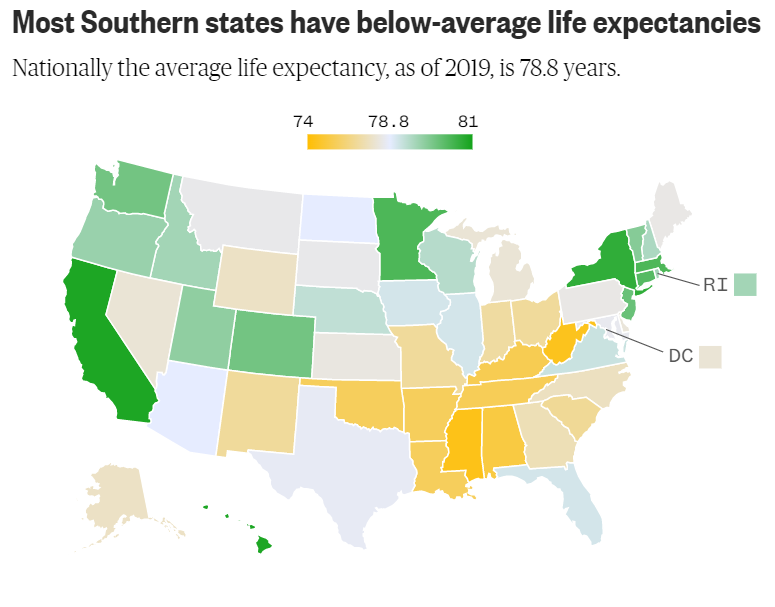Life expectancy was lowest in states with a high prevalence of obesity, according to new data from the Centers for Disease Control (CDC) out Thursday.
A report out from the National Center for Health Statistics ranked the 50 states and Washington D.C. in order of life expectancy for 2019 preceding the pandemic. Of the nine states at the bottom, more than a third of each one’s residents was categorically obese in the same year. Ohio, the state with the 10th lowest life expectancy in 2019, was added to the CDC’s list of at least 35 percent of its population obese in 2020.

The state with the lowest life expectancy, Mississippi, is also home to the highest proportion of obese residents at nearly 40 percent of its population. Residents had an average lifespan of 74.4 years; more than four years shy of the 2019 national average at 78.8.
The low level of baseline health in the months preceding Covid-19’s outbreak primed the nation for severe outcomes from a virus with which individuals are three times likelier to be hospitalized if infected. As a primary comorbidity to Covid-19, in seven out of the top ten states with the highest viral mortality rate, more than 35 percent of the population qualified as obese. Those states included Mississippi, Alabama, Louisiana, Tennessee, West Virginia, Michigan, and Arkansas. Mississippi once again claimed the top spot with 3,867 deaths per million residents, as of Thursday night.
While not the sole contributor to lower life expectancy, with intertwined factors also including poverty, deaths from suicide, and opioids, the association with obesity is painfully present.
Contrary to efforts to combat poverty and drug overdoses, however, the underlying epidemic that is obesity continues to worsen amid a growing movement that favors complacency. According to a study from the American Psychological Association (APA) last year, 42 percent of American adults reported undesired pandemic weight gain, adding an average 29 pounds.
Cultural influencers continue to celebrate weight gain as if the long-term medical consequences were absent. Last year, diabetes, of which obesity is also often an underlying culprit, eclipsed a six-figure death toll for the second consecutive year as celebrities glorify physically harmful lifestyles. Lizzo, for example, a primary ambassador for the pro-fat movement, rang in the New Year with a celebratory post about her weight gain.
In January, the women’s publication Self Magazine launched a project branding obesity as “The Future of Fitness.”
Pro-fat messaging will only lead to lower lifespans and heightened severity of future pandemics in the long-term, and reduced mobility in the short-term for the millions buying complacency.









